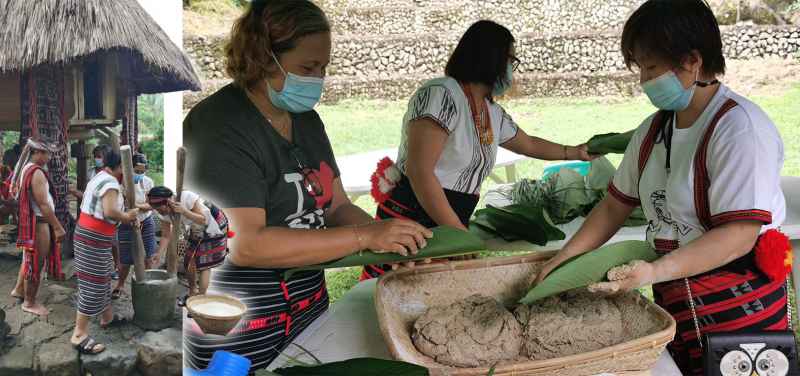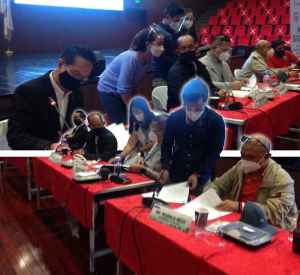Keeping traditions alive amidst the pandemic

In Kiangan, Ifugao, traditional rice agricultural rituals still persist at this time of pandemic. Organized and hosted by the Save Ifugao Terraces Movement (SITMo) and the Indigenous Peoples Education (IPEd) Center in Kiangan, community members, cultural and heritage conservation advocates participated in the ahi-bakle that marks the end of the harvest season in the agricultural calendar of the Hapuwan Ifugaos.
Ahi-bakle commences with the danglot ritual by a mumbaki as thanksgiving to the gods of rice for good harvest. The bulul, as a rice deity, is libated in wine and rice dough portions are placed on its shoulders and arms- a gesture of keeping a promise in some ancient divine pact.
As a celebration of good harvest, women participated in the pounding of dayakkot (glutinous rice), winnowing, mixing its ingredients such as
sugar, coconut and roasted sesame seeds then wrapped the dough using banana, la-u or rattan leaves before being placed in a huge pot for steaming.
On the other hand, men prepared and cooked tinawon rice and butchered chickens for lunch. The cooked binakle is shared among the people present. The children also enjoyed participating in dancing, singing and observing the different processes of ahibakle. Dr. Eva Marie Codamon-Dugyon, Ifugao State University (IFSU) President sees these opportunities as a positive engagement of the University and the community.
“The participation of IFSU during this ahi-bakle is in line with our vision to promote the rich cultural heritage of our people. We believe that in these challenging times, it is but appropriate to maximize our positive values and practices as pathways for survival while keeping our traditions alive,” added University President Dugyon.
“One of the challenges during this pandemic is its impacts to community life. It limited mobility and performances of practices due to health protocols. The conduct of ahi-bakle is a testament that even in pandemic, our people can practice their traditions while observing health protocols and standards,” quipped Eulalie D. Dulnuan, Director for IFSU Ifugao Rice Terraces as Globally Important Agricultural Heritage System (IRT-GIAHS) Center.
Ruben Gumangan, a local Indigenous Knowledge (IK) Holder, noted that, “The essence of bakle is a thanksgiving to Maknongan for abundant harvest and invoking his blessings for another rice cycle. It also means sharing of blessings among the people in the community.”
Marlon M. Martin, Chief Operations Officer of SITMo, on the other hand believes that the performance of bakle is an important aspect in transmitting these indigenous knowledge, systems and practices (IKSP) to our younger generations. “I am actually happy to see children and our IK holders interacting on the different aspects of IKSP like our bakle ritual,” concluded Martin. (with references from The Kiangan Book Nook, Kiangan, Ifugao) Jude C. Baggo
KASO NG COVID SA BAGUIO CITY LUMULOBO DAHIL SA DELTA VARIANT
September 19, 2021
Lifestyle
SM BAGUIO HUETOPIA SUMMER HANGOUT
April 25, 2024
ANGEL’S WALK FOR AUTISM 2024
April 15, 2024
CELEBRATE EARTH DAY BY SUPPORTING SUSTAINABLE STORES AT SM
April 10, 2024





